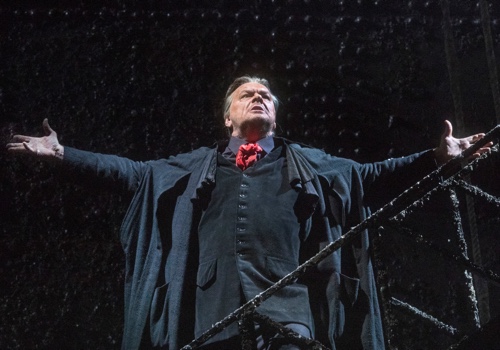
Nearly thirty years old, August Everding’s resolutely static, no-idea production returned for its final run after an absence of seven years. As revived by Stephen Pickover, this work about a haunted voyager cursed to endlessly sail the seas proved disappointingly stand-and-deliver. The great Senta-Dutchman duet had both characters facing forward on opposite sides of the stage stock-still for fifteen minutes—ugh!
Hans Schavernoch’s looming monochromatic sets were again mostly effective although I’m still baffled (as I was first in 1992) why the Dutchman delivers his wrenching monologue from his ship’s gangplank as it stands scarily suspended in mid-air. The sole interesting note in Lore Haas’s stolidly traditional costumes might be the grand black cape which envelops the Dutchman bringing to mind apt vampiric associations which, of course, the production doesn’t explore.
I hadn’t been impressed by his Mandryka during his Met debut season several years ago, but Volle’s subsequent Hans Sachs was endearing and warmly sung. In the Strauss role his top register was often strained but his powerful Dutchman rang out securely there although occasionally his softer singing lost focus.
This was a particularly angry and bitter wanderer and one sometimes wished for a bit more warmth in his portrayal which might help make Senta’s obsession less overtly masochistic. But his fierce concentration and enviable stamina impressed galvanizing the evening.
As the Norwegian maid inexorably drawn to a legend rather than a flesh-and-blood suitor, Amber Wagner was often thrilling—and often frustrating. Her big glowing soprano filled the large house effortlessly, the high notes gratifyingly secure.
And yet all too often it seemed as if she was content to just pump out her glowing sound—little was done to delineate Senta’s boredom with village life which leads to her all-consuming passion for the figure in the portrait. She didn’t vary the verses of her well-sung ballad, and the character’s volatile mania come across with little intensity.One can imagine her making a greater impact with a more placid character like Ariadne rather than the dramatically unstinting Senta. In both her strengths and weaknesses, Wagner often reminded me of the young Deborah Voigt.
Franz-Josef Selig’s hearty, jovial Daland perhaps gave short shrift to the character’s conniving and venal nature. His big resonant bass too often wobbled and lost focus much as his Met Sarastro had in 1998. The deluxe casting of veteran Dolora Zajick didn’t entirely come off as much of the role lies uncomfortably low for her but she still created a frighteningly strict Mary who easily dominated the first part of the second act during which the village girls sew rather than spin.
Initially Ben Bliss’s Steersman sounded underpowered but he quickly righted himself and delivered his plaintive song with lieder-like finesse. AJ Glueckert had replaced Jay Hunter Morris as Erik late in the rehearsal process. Making his Met debut in less than ideal circumstance, he acquitted himself well enlivening a bland and ineffectual character with an appealingly plaintive tenor. Occasional strain made one wonder though if he should be performing dramatic roles as Bacchus and Don José at this point in his career.
Usually this late in the long Met season one has to make allowances for an exhausted chorus and orchestra, but both were in fine form Tuesday, especially the thunderous male chorus whose lusty sailors were highlights of both the first and third acts. However, the wrong-headed decision to have the Dutchman’s crew sing offstage through muffled amplification considerably lessened the impact of that chilling scene.
This Holländer was Nézet-Séguin’s first appearance at the Met since his appointment as its new Music Director, and he was greeted at the beginning with a huge ovation from the audience and at his solo curtain call with an astonishing volley of red and yellow roses from the pit, a gesture that clearly surprised and moved him. His wonderfully kinetic conducting style was so interesting to watch that one was happily distracted from the sometimes uninteresting stage action.Although there were some occasional clunkers from the brass, his clearly energized band otherwise vibrantly responded to his brisk nuanced reading in which all the varied orchestral voices arose from the pit with admirable clarity. Although the long difficult central duet sometimes lost tension, the infectious choruses at the beginning of the third act had tremendous swing and the glorious apotheosis at the end bloomed wonderfully.
Just four more performances remain this season including Saturday’s broadcast, but one hopes that the new Music Director will continue to refine his dynamic conception of Holländer when a rumored and much needed new production by François Girard arrives in 2019-20.
Before then, another chance to experience Nézet-Séguin’s Wagner (albeit with a work at the opposite end of the composer’s career) occurs next season when he conducts a revival of the Girard Parsifal in February.
A much different Wagner work arrives tomorrow on “Trove Thursday” but in the meantime a Holländer with the luminous Johanna Meier as Senta can be found here.
Photo: Richard Termine



